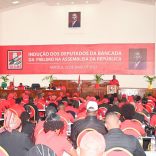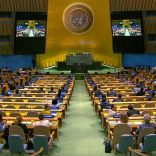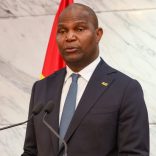Mozambique: Vitano Singano's party and wife do not confirm his death - O País
Mozambique: Closure of Renamo bases shifts onus to Frelimo government – analysts

FILE - For illustration purposes only. [File photo :Twitter / @ONUMocambique]
The closure of the last base of the armed wing of Renamo, Mozambique’s main opposition party, shifts the “onus” of peacekeeping to the Frelimo government, which should move to “de-partisan the state” and promote “inclusion and reconciliation” in society and state institutions, analysts have told Lusa.
“The closure of the [last] Renamo base has the scope to pass the onus to the government [because] the government could continue to say that Renamo is the one who does not want to demilitarise itself,” said Borges Nhamire, a researcher at the Institute for Security Studies (ISS), an independent research entity.
Nhamire pointed out that the deactivation of the Renamo military structure alone does not guarantee lasting peace in the country, because the movement’s armed wing is not the root of the conflicts between the government and the main opposition party.
“The excessive partisanship of the state, which I prefer to call state capture, by the Frelimo party, which does not allow other people, other entities and other forces that are not from the party to also benefit from the state and resources” are the main factors of political violence, Nhamire argued, stating that the alleged manipulation of electoral processes by the governing party is also one of the root causes of armed violence.
“The conflict with Renamo is essentially based on political causes” due to electoral disputes, the researcher stressed, pointing to the recent example of the alleged “manipulation” of the registration for the 11 October local elections.
“Frelimo is not willing to stop manipulating electoral processes,” he charged.
Nhamire noted that the success of the Disarmament, Demobilisation and Reintegration (DDR) of the armed wing of the main opposition party will also depend on the extent to which former Renamos guerrillas and their dependents are reintegrated socially, economically and politically.
For his part, João Feijó, a researcher at Mozambique non-governmental organisation Observatório do Meio Rural (OMR), considered the closure of the last Renamo base to be positive, because the country should not have armed groups, but he also warned of the need to de-partisan the state, with a view to the political, economic and social inclusion of all the country’s people.
“On the one hand, it is very good, very good that Renamo demilitarises itself, because this is halfway towards building a [democratic] rule of law, because we cannot have a functioning constitution with armed groups in the bush blackmailing the government every time something does not please them,” he said.
But, he continued, the other “half of the road” – after the demilitarisation of Renamo – involves ending the “monopolisation” of state institutions by Frelimo, including electoral bodies.
“Frelimo has confused itself with the state, since it came to power in 1975,” he said, noting that after that Frelimo “took over the monopoly” of public institutions.
The party in power since independence from Portugal, he said, had blocked access to economic resources by anyone who was not a member and it thus fears leaving government, because that has been the way for the elites to have access to economic opportunities.
Feijó also argued that former Renamo guerrillas should be provided with some means of survival so that they do not fall again into the temptation of taking up arms again.
“If there is money to do that, I think so,” he said: the pensions announced should be paid, but “if they have to go to the State Budget, it will be complicated” because Mozambique’s state is much “weakened” in financial terms.
Elcídio Bachita, an economist, also called for a reduction of the weight of the governing party in state institutions, with a view to promoting genuine reconciliation and the removal of hotbeds of political and military tension in the country.
“In order to maintain peace, national reconciliation, redistribution of resources and [a move to] de-partidan the state apparatus is necessary, because it has always been one of Renamo’s main demands,” Bachita stressed.
It is, he said, crucial that the military logistics of the main opposition party have been dismantled in order to attract investment to and improve the business environment in central Mozambique, because “nobody injects capital where there are armed men.
“A fundamental step has been taken to make the centre of the country an attractive place for business,” he summarised.
The last Renamo base was closed in Vunduzi, in Gorongosa district, in the central province of Sofala, on Thursday – more than 30 years after the official end of Mozambique civil war.
The ceremony was attended by the country’s president Filipe Nyusi, and the Renamo leader, Ossufo Momade.
It marked the end of the demobilisation process for 5,221 guerrillas who remained in their bases in remote areas and who started to hand in their weapons four years ago under the Maputo Agreement for Peace and National Reconciliation, signed in August 2019.
This demob phase is to be followed by the reintegration phase, which includes the start of pension payments to the former guerrillas.
“Nós agradecemos aos heróis vivos e mortos da #RENAMO que colocaram o interesse da nação acima de suas vidas; Que todos bem hajam no fim da vossa missão como combatentes”
– Ossufo Momade, Líder da RENAMO, no encerramento da sua última base ativa como parte do #ProcessoDePaz pic.twitter.com/209WYf3iWx
— ONU Moçambique (@ONUMocambique) June 15, 2023
“Moçambique conta com o apoio continuado das @NacoesUnidas na sua caminhada rumo à paz definitiva e à reconciliação nacional”
– Mirko Manzoni, Enviado Pessoal de @antonioguterres para Moçambique, durante encerramento da última base da #RENAMO pic.twitter.com/dWDzWEEgSa
— ONU Moçambique (@ONUMocambique) June 15, 2023













Leave a Reply
Be the First to Comment!
You must be logged in to post a comment.
You must be logged in to post a comment.